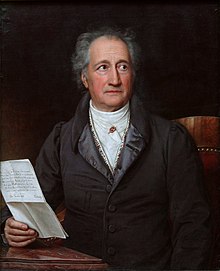Johann Wolfgang von Goethe
| Johann Wolfgang Goethe | |
|---|---|

Goethe in 1828
|
|
| Born |
28 August 1749 Frankfurt, Holy Roman Empire |
| Died | 22 March 1832 (aged 82) Weimar, Grand Duchy of Saxe-Weimar-Eisenach, German Confederation |
| Occupation | Poet, novelist, playwright, natural philosopher, diplomat, civil servant |
| Nationality | German |
| Alma mater | |
| Literary movement | |
| Notable works | Faust; The Sorrows of Young Werther; Wilhelm Meister's Apprenticeship; Elective Affinities; "Prometheus"; Zur Farbenlehre; Italienische Reise; Westöstlicher Diwan |
| Spouse | Christiane Vulpius (m. 1806; d. 1816) |
| Children | 5 (4 died young)
|
| Relatives | Christian August Vulpius (brother-in-law) |
|
|
|
| Signature |  |
Johann Wolfgang von Goethe (/ˈɡɜːrtə/;German: [ˈjoːhan ˈvɔlfɡaŋ ˈɡøːtə]; 28 August 1749 – 22 March 1832) was a German writer and statesman. His body of work includes epic and lyric poetry written in a variety of metres and styles; prose and verse dramas; memoirs; an autobiography; literary and aesthetic criticism; treatises on botany, anatomy, and colour; and four novels. In addition, numerous literary and scientific fragments, more than 10,000 letters, and nearly 3,000 drawings by him exist.
A literary celebrity by the age of 25, Goethe was ennobled by the Duke of Saxe-Weimar, Carl August in 1782 after taking up residence there in November 1775 following the success of his first novel, The Sorrows of Young Werther. He was an early participant in the Sturm und Drang literary movement. During his first ten years in Weimar, Goethe was a member of the Duke's privy council, sat on the war and highway commissions, oversaw the reopening of silver mines in nearby Ilmenau, and implemented a series of administrative reforms at the University of Jena. He also contributed to the planning of Weimar's botanical park and the rebuilding of its Ducal Palace, which in 1998 were together designated a UNESCO World Heritage Site.
...
Wikipedia
